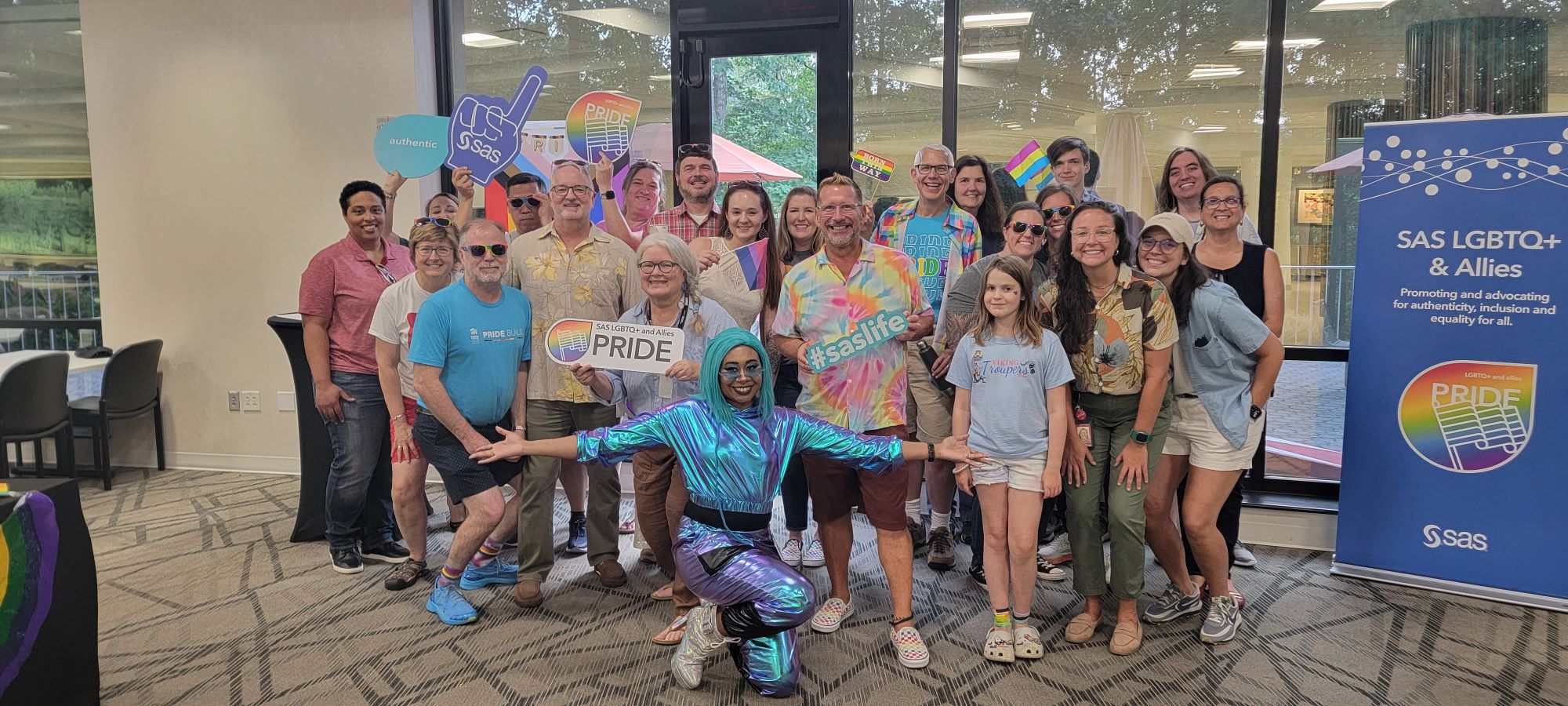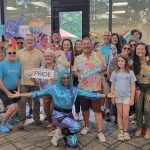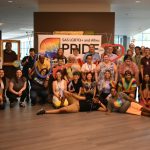Since 1987, the LGBTQ+ community observes and celebrates Coming Out Day on October 11, to recognize the second march on Washington when half a million people participated in a demonstration for Lesbian and Gay Rights. “Coming out” is a metaphor for people who self-disclose or announce their sexual orientation or gender identity, as a means for embracing themselves, contrary to what was assumed about them prior.
For this occasion, Sr Data Scientist and SAS LGBTQ+ & Allies (PRIDE) employee inclusion group (EIG) leader, Allie DeLonay, asked members to share their anonymous thoughts on the importance of coming out and describe how their lives have been impacted as a result. The quotes included in this blog speak to the individual and unique experience of employees, and do not necessarily reflect the general consensus of the LGBTQ+ community.

Why does coming out matter?
Coming out is a very personal decision and experience, and it is unique to the individual. Coming out allows individuals to be themselves unapologetically and shows others in the community that we should take pride in who we are as individuals, and that they are not alone.
“I feel a sense of freedom and joy. Before I came out, I felt hidden and ashamed. I'm able to form wonderful and joyful relationships with friends and neighbors. Before I came out, I didn't know which way to turn or where to seek authentic friendships.”
When I asked SAS PRIDE EIG members why coming out was important to them, many responded that coming out shouldn’t matter. While this is the goal, I’m not sure we are quite there yet as a society; many people are sadly shamed for being part of the LGBTQ+ community. Until the shame stops, there will be a need for us to explicitly come out. So often people generalize about groups they do not understand or agree with. When we make ourselves known, it humanizes the LGBTQ+ community and forces people to question the assumptions and stereotypes they’ve come to associate with the community. When you start to notice that more people are coming out and are living authentically in the process, it becomes a lot easier to prescribe to the idea that it is, in fact, normal and okay to be queer.
“Hiding who I am felt like a lie that carried a lot of shame and guilt. Coming out gave me the freedom to simply exist, just as I am, and allow others to embrace all the pieces of me.”
While coming out to our friends, family, and coworkers can be difficult, oftentimes the hardest part of the process is coming out to yourself. Homophobia is so deeply rooted in our culture and implicit negative thoughts can sabotage our own journeys; we must intentionally reject them to truly feel comfortable in our own skin.
“It started with coming out to myself: realizing/concluding that I am transgender. At that point, I started coming out to others and being myself by presenting and behaving how I truly am. It has been a complete change in my life.”
Coming out affords relief to simply, be – not having to censor parts of your life to hide who you truly are.
“I am not forever thinking about what and how I say things. Previously, I had become adept at referring to ‘my partner’ rather than boyfriend or husband, or avoiding gender-specific pronouns to allay any suspicions about my sexuality with people I did not know or trust.”
When you came out, how did your friends and family react?
Coming out to our loved ones is hard and can be anxiety-inducing. One PRIDE member shared, “Would they feel the same way and treat me the same way if they knew I wasn't straight?” This is a big reason many folks come out to different people in their lives in stages. The idea of coming out to those who might react negatively can get more palatable the more our loved ones accept us for who we are. A lot of people anticipate that their friends and family will react negatively; however, sometimes they are pleasantly surprised when they receive support, instead.
“My father is a pretty conservative Veteran and I anticipated he would not take my coming out as bisexual well. When I did share it with him, I was in a relationship with another woman. I was so proud that he took the news in stride and was even eager to meet my girlfriend at the time. He never acted anything but accepting to me directly, and it was so appreciated.”
Another PRIDE member stated,
“When I [came out to] my sister, she asked ‘Are you happy’? I said ‘Yes’. She said ‘Cool.’ This was probably the easiest and most wholesome conversation, and I loved it so much."
"Some people were surprised, some weren't. But the general consensus was, ‘we don't care, as long as you're happy."
This is not always the case. Unfortunately, many folks receive backlash from their families. For example, Pride members shared the following quotes from family members or how they felt after coming out to them.
"Well, I guess your dad and I need to go to therapy."
“…my mother stated, ‘I would burn in hell and die a lonely, unhappy man’".
“With friends I suddenly became a token to be passed around for social credit. With most family I become a pariah. I don’t know what I would have hoped for. I pretty much got what I expected. At least there was no violence.”
Sometimes people don’t realize that their words, intentionally hurtful or not, will get imprinted into us for the rest of our lives.
“Hearing my family [say horrible things] about LGBTQIA+ community, and them not knowing that they were spewing it about me, was incredibly hurtful. It caused me to slowly alienate myself from them.”
At the end of the day, most queer folks don’t want it to get seen as a big deal. Afterall, it’s just a part of who we are.
Is it easier or more difficult to talk about being queer at work?
It’s harder to exist, let alone thrive, in a world where you can’t be your genuine self for fear of how others will react and treat you. Queer people must decide whether to be out, or come out, at work, which carries the uncertainty of being treated differently as a result. Many PRIDE members stated that they don’t think it’s necessary to be out at work because it doesn’t affect how you do your job. Being out at work can be empowering. But it can also be as or more challenging than being out to friends and family. Fear of being treated differently by coworkers is a real and valid feeling, especially if past work experiences have negatively impacted one’s career.
“I came out later in life (within the past couple years), so this is my first experience being openly gay at work. I would say I am much more private about my personal life and experiences at work in general, but I appreciate the safe spaces (like the SAS PRIDE EIG) to speak openly and freely. Hearing others be so open has warmed my heart in ways I never knew I needed and makes me feel... normal.”
- 2023 SAS LGBTQ+ & Allies Celebration
- OutRaleigh
- 2022 SAS LGBTQ+ & Allies Celebration
“Found family is greater than blood family.”
For those that say being out at work is easier, they attribute that experience to having open conversations about it, when appropriate. For example – with my team, the Data Ethics Practice, we talk about the importance of inclusivity and having diverse perspectives. Since we have open conversations about diversity and inclusion, it’s easier for me to be open. However, not every person works on a team where they can have open conversations like this; therefore, they may not feel this same sense of openness. It’s extremely important that employees in the LGBTQ+ community feel as though they are supported and safe to be their authentic selves at work.
“The most important message here is that it is extremely important for managers and executives to create an accepting and safe environment within their teams.”
Having inclusive policies and programs is important, but it is also imperative that leaders foster a safe and welcoming environment for their colleagues and teams. Actions speak louder than words. Wishing a team member “Happy Pride” or attending a PRIDE EIG function as a supportive team member and ally can be the most effective way to really foster an inclusive environment for queer colleagues.
Coming out is a personal journey, and a process. Any advice for those who want to come out?
Coming out is a process; one that takes courage and bravery. It’s also one that always involves making a choice: to reject heteronormativity in favor of being seen for who we truly are or choose to not allow the world to see all of you. Everyone has a different journey and timeline for coming out. Do not pressure someone to come out before they are ready. The best thing you can do is offer your unconditional support.
“Though it is a tough conversation (with yourself and with others), coming out is a great way to discover who is in your corner. It took me a long time to realize that coming out is almost a daily occurrence, but if you have the strength to be open with others, they will show their true colors. My hope is that those are colors of love and acceptance.”
While the LGBTQ+ community has made a lot of progress, we still have a lot to fight for now to protect the rights we were granted by those who came before us. Coming out means showing the world that we exist and deserve the right to be considered human.
“It really sucks to see my rights and existence constantly debated or threatened. I am tired of being [criticized] to feel comfortable in my own body.”
While it is a privilege to work in a safe environment that encourages employees to show up authentically, that is not the case for everyone. And it is certainly not always the case outside of work.
Here are some resources to explore what coming out means to you, and how to support friends, family, and colleagues during their coming out journey.




3 Comments
What a wonderful article! Thanks so much for taking the time to put this all together. So many meaningful and heartfelt quotes. I'm so grateful to take this journey with all the wonderful people who work here at SAS.
Thank you, Danielle, Allie, and contributors from the SAS LGBTQ+ & Allies EIG! This is a great article!
Thank you to the SAS LGBTQ+ & Allies PRIDE community for sharing your perspectives and experiences. No doubt it takes courage! Sharing helps others know they are not alone, and helps allies and loved ones of those coming out more aware of how best to support you. Thanks for leading this blog, Allie!